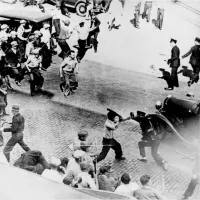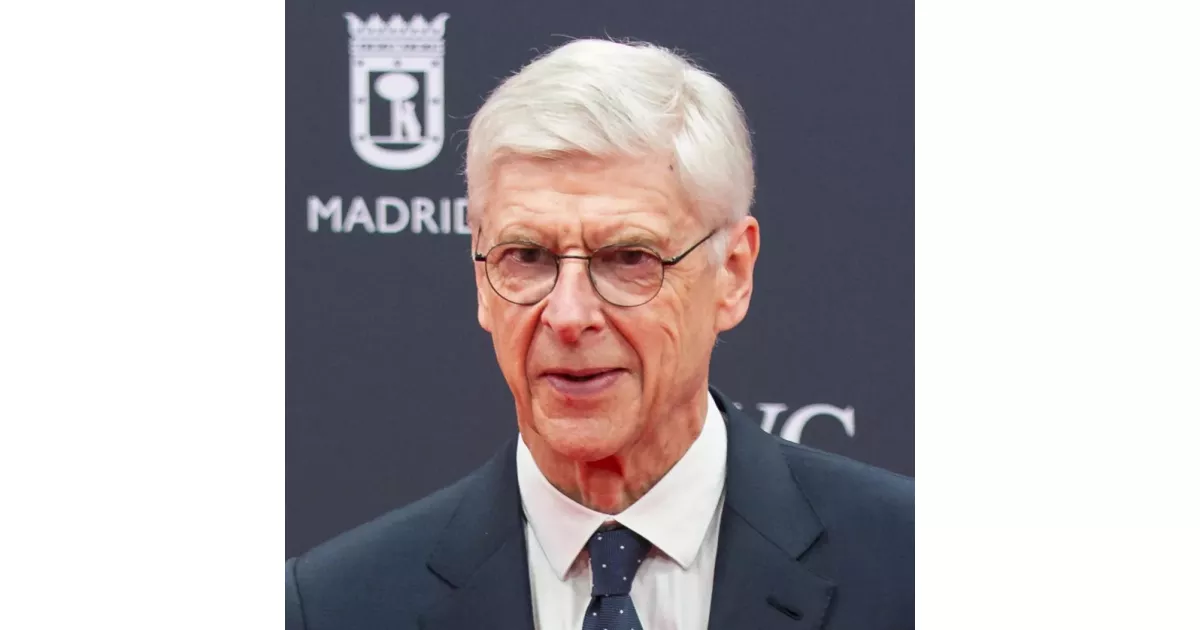Resilience and perseverance in the journey of Arsène Wenger. A timeline of obstacles and growth.
Arsène Wenger is a French former football manager and player, currently FIFA's Chief of Global Football Development. He managed Arsenal from 1996 to 2018, becoming the club's longest-serving and most successful manager. Wenger significantly impacted English football by modernizing scouting, training, and diet practices, contributing to Arsenal's success and the globalization of the sport.
1985: Nancy's Bottom-Half Finish
In 1985, Nancy's bottom-half finish proved a false dawn for the club.
1986: Nancy Finishes 18th, Retains League Status
In the 1985-86 season, Nancy finished 18th, which meant they had to win a play-off match to avoid relegation. They retained their league status with a 3-2 aggregate win against Mulhouse.
September 1994: Wenger Dismissed as Monaco Manager
On 17 September 1994, Arsène Wenger was dismissed as Monaco manager due to a poor start to the 1994-95 season, with the team in 17th spot in the table.
September 1996: Red Cards Begin to Accumulate for Wenger's Arsenal
From September 1996 to February 2014, Arsène Wenger's Arsenal received 100 red cards, highlighting issues with discipline within the team despite their success.
September 1996: Poor Disciplinary Record
In September 1996, Arsène Wenger faced scrutiny for Arsenal's poor disciplinary record.
September 1996: Reaction to Wenger's appointment at Arsenal
In September 1996, Arsène Wenger's arrival at Arsenal was met with confusion by some players, supporters, and media, due to his relative obscurity in English football. Unlike his predecessors, Wenger was given control over transfers, contracts, and training sessions. Wenger made steps to change the drinking culture that afflicted Arsenal, promoted pasta as the pre-match dish, encouraged boiled chicken instead of red meat and discouraged junk food. Players received optional vitamin injections and Creatine.
October 1996: Wenger's first match as Arsenal manager
On October 12, 1996, Wenger's first match was a 2–0 away victory over Blackburn Rovers. However, he interfered in Arsenal's UEFA Cup defeat to Borussia Mönchengladbach on 24 September, nine days prior to taking charge of the club. This particular approach of management resonated with the other players, who were sceptical of his ideas at first. The English players often set up pranks on Wenger to relieve hostility and nicknamed him "Inspector Clouseau", due to his clumsy nature.
1996: Wenger Presided Over Rice's Caretaker Duties
In 1996, during a match against Borussia Mönchengladbach, Wenger presided over Rice's caretaker duties at Arsenal, and ordered the team to switch from their preferred 3–5–2 formation to 4–4–2. The tactical change did not have its desired effect, as Arsenal lost the game.
February 1997: Wenger rules out Arsenal's title chances
In February 1997, after a period of poor form, Arsène Wenger ruled out his team's chances of winning the Premier League title.
1997: Arsenal struggles in November
Arsenal struggled in November 1997. Defeat at home to Blackburn Rovers left the club in sixth position before Christmas and seemingly out of contention for the title. Wenger called for an urgent team meeting, where "home truths were spoken, fingers pointed, players were geed up."
August 2000: Charged with Threatening Behaviour
In August 2000, Arsène Wenger was charged with "alleged threatening behaviour and physical intimidation" towards a fourth official, resulting in a fine and a touchline ban, which was later appealed and reduced to a fine.
2000: UEFA Cup Final Loss
In 2000, Arsenal exited the Champions League at the group stage and dropped to the UEFA Cup where they reached the final, only to lose to Galatasaray on penalties. In the league, Arsenal finished as runners-up, 18 points behind Manchester United.
October 2002: Loss to Everton Ends Unbeaten Run
In October 2002, Arsenal's loss to Everton ended a run of four matches without a win, halting their momentum in the league.
March 2003: Title Race Shifts to Manchester United
By March 2003, Arsenal's eight-point lead over Manchester United had diminished, shifting the title race in United's favor, especially after a draw against Bolton Wanderers.
2003: Criticism of Arsenal's Discipline
In 2003, Arsenal's disciplinary record was heavily criticised, described as a "crime-wave".
October 2004: "Pizzagate" Incident at Old Trafford
In October 2004, after Manchester United ended Arsenal's 49-game unbeaten Premier League run, Cesc Fàbregas threw a pizza at the opposition in the tunnel during the "Pizzagate" incident at Old Trafford. Wenger accused Ruud van Nistelrooy of being "a cheat" and was fined by the FA.
October 2004: Unbeaten Run Ends Against Manchester United
On October 24, 2004, Arsenal's 49-game unbeaten league run ended with a 2–0 defeat at Manchester United.
2004: Arsenal's Injury Record
From 2004–05 to 2014–15, Arsenal's players lost 13,161 days through injury, the most in the Premier League.
February 2005: Arsenal Fields Team with No British Players
On February 14, 2005, Arsenal fielded a 16-man squad with no British players for the first time in the club's history, prompting concerns about the impact on English football.
November 2006: Wenger Rules Out Title Chances
In November 2006, following a defeat to Bolton, Wenger ruled out Arsenal's chances of winning the league title for the 2006-07 season.
2006: Arsenal's Youth Investment
In 2006, Arsenal moved to the Emirates Stadium, and Arsène Wenger prioritized investing in youth players rather than purchasing experienced players, aiming to create a unique "identity" for the club. This involved developing players with a love for the club, though the youth setup's success didn't match the late 1990s and early 2000s.
February 2007: League Cup Final Defeat to Chelsea
In February 2007, Arsenal's youthful team lost the League Cup final to Chelsea 2–1, marking a setback in their campaign.
December 2007: Unbeaten Run Ends Against Middlesbrough
In December 2007, Arsenal's run of 22 league matches unbeaten ended with a defeat to Middlesbrough.
2007: FA Investigation and Fine
Following the 2007 Football League Cup Final, Arsène Wenger called a linesman a liar, leading to an investigation by the FA, a fine, and a warning.
February 2008: Eduardo Injury
On February 23, 2008, a career-threatening injury to striker Eduardo against Birmingham City acted as a turning point in Arsenal's season.
2009: Ferguson's Criticism of Wenger's Transfer Policy
In 2009, Sir Alex Ferguson criticized Arsène Wenger's transfer policy for lacking balance and needing defensive players. Wenger's player recruitment was also questioned for their character and leadership capabilities.
March 2011: Improper Conduct Charge by UEFA
In March 2011, Arsène Wenger was charged with improper conduct by UEFA for comments made to a referee, resulting in a fine and suspension from UEFA club competitions, which was later extended for communicating with Arsenal's bench during a ban.
August 2011: Arsenal Trounced by Manchester United
On August 29, 2011, Arsenal suffered an 8–2 defeat to Manchester United, representing their worst defeat in 115 years.
2011: Football League Cup Final Defeat
In 2011, Arsenal lost the Football League Cup Final to Birmingham City due to a mix-up between Szczęsny and Koscielny.
2011: Reverting to Proven Talent
Since the 2011–12 season, Arsène Wenger reverted to buying proven talent and blending experience with youth in domestic cup competitions due to increased revenue from the Emirates move and new sponsorship deals. This allowed Arsenal to make marquee signings.
November 2012: Arsenal Falls Behind Manchester United
By November 2012, Arsenal struggled to find consistency and were 12 points behind leaders Manchester United in the league.
2013: Arsenal's Defeat and Transfer Activity
In 2013, Arsenal began the season with a home defeat to Aston Villa. This prompted criticism of the club's transfer inactivity. However, in the final week of the transfer window, Wenger re-signed Flamini and sanctioned the club record signing of Mesut Özil from Real Madrid.
2013: Compromising Attack-Minded Principles
In 2013, defeats in the big games during 2013–14 led to Wenger compromising his attack-minded principles in favour of keeping it tight.
February 2014: Arsenal Reaches 100 Red Cards Under Wenger
Between September 1996 and February 2014, Arsène Wenger's Arsenal received 100 red cards, highlighting disciplinary issues within the team.
February 2014: 100 Red Cards
By February 2014, Arsenal had received 100 red cards under Arsène Wenger's management.
October 2014: Touchline Spat with José Mourinho
In October 2014, during a Premier League match between Arsenal and Chelsea, Arsène Wenger was involved in a touchline spat with José Mourinho, later apologizing for his behavior.
2016: Criticism of Wenger's Methods
In 2016, Henry Winter reasoned that Arsène Wenger's methods no longer gave him an advantage over others, and he needed to adapt or resign.
Mentioned in this timeline

Liverpool is a port city and metropolitan borough located in...

Christmas is an annual festival celebrated on December th commemorating...
Germany officially the Federal Republic of Germany is a Central...
Japan is an East Asian island country in the Pacific...

Football encompasses a variety of team sports centered on kicking...
Monaco a sovereign city-state on the French Riviera is the...
Trending

6 minutes ago Prince Andrew faces exile at Sandringham after losing title; future uncertain.

2 hours ago Ronda Rousey criticizes Joe Rogan's fighting experience and reflects on fan reactions.

2 hours ago Cindy Crawford shines at the 2025 LACMA Art + Film Gala.

3 hours ago Victoria Mboko Dominates, Reaches Hong Kong Open Final After Fernandez Victory

3 hours ago Amazon Cancels Lord of the Rings MMO Amidst Struggle to Compete with Steam

1 day ago Kendall Jenner frustrated by Caitlyn's views; Caitlyn reunites with kids on Kardashians.
Popular

Gavin Newsom is an American politician and businessman currently serving...

Candace Owens is an American political commentator and author known...

Chuck Schumer is the senior United States Senator from New...

Doug Ford is a Canadian politician and businessman currently serving...

XXXTentacion born Jahseh Dwayne Ricardo Onfroy was a controversial yet...
Turning Point USA TPUSA is an American nonprofit organization founded...
